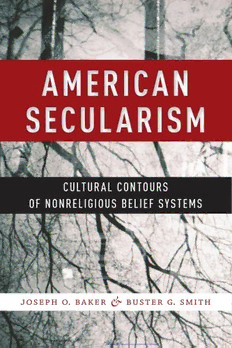
American Secularism: Cultural Contours of Nonreligious Belief Systems PDF
Preview American Secularism: Cultural Contours of Nonreligious Belief Systems
American S ecularism Religion and So cial Trans formation General Editors: Anthony B. Pinn and Stacey M. Floyd- Thomas Prophetic Activism: Progressive Religious Justice Movements in Contemporary America Helene Slessarev- Jamir All You That Labor: Religion and Ethics in the Living Wage Movement C. Melissa Snarr Blacks and Whites in Christian America: How Racial Discrimination Shapes Religious Convictions James E. Shelton and Michael O. Emerson Pillars of Cloud and Fire: The Politics of Exodus in African American Biblical Interpretation Herbert Robinson Marbury American Secularism: Cultural Contours of Nonreligious Belief Systems Joseph O. Baker and Buster G. Smith American Secularism Cultural Contours of Nonreligious Belief Systems Joseph O. Baker and Buster G. Smith NEW Y ORK UNIVERS ITY P RESS New York and London NEW YORK UNIVERSITY PRESS New York and London www.nyupress.org © 2015 by New York University All rights reserved References to Internet websites (URLs) were accurate at the time of writing. Neither the author nor New York University Press is responsible for URLs that may have expired or changed since the manuscript was prepared. Library of Congress Cataloging-in-Publication Data Baker, Joseph O., 1938– American secularism : cultural contours of nonreligious belief systems / Joseph O. Baker and Buster G. Smith. pages cm. — (Religion and social transformation) Includes bibliographical references and index. ISBN 978-1-4798-6741-7 (cl : alk. paper) — ISBN 978-1-4798-7372-2 (pb : alk. paper) 1. Secularism—United States. I. Title. BL2747.8.B285 2015 211’.60973—dc23 2015012227 New York University Press books are printed on acid- free paper, and their binding materials are chosen for strength and durability. We strive to use environmentally responsible suppli- ers and materials to the greatest extent possible in publishing our books. Manufactured in the United States of America 10 9 8 7 6 5 4 3 2 1 Also available as an ebook For Amy, Hazel, and Ingrid This page intentionally left blank Contents Acknowledgments ix Introduction: A Nation of Nonbelievers 1 1. Classifying Secularities 13 2. A Cultural View of Secularities 25 3. Historical Foundations 45 4. The Great Abdicating 66 5. Nonreligious Belief Systems 89 6. Ethnicity, Assimilation, and Secularity 106 7. Gender and Secularity 133 8. Marriage, Family, and Social Networks 151 9. The (Explicit) Politics of Secularity 167 Conclusion: A Secular, Cosmical Movement? 201 Data Sources Appendix 219 Notes 223 Bibliography 271 Index 283 About the Authors 293 vii This page intentionally left blank Acknowledgments Although books are credited to their authors, behind any creative endeavor are numerous people supporting, contributing to, and enhanc- ing the project who do not receive their due credit. Numerous scholars generously lent their time and talent to offer feedback on parts of this manuscript, including Zach Dresser, Amy Edmonds, Penny Edgell, Stephen LeDrew, Jerry Park, Kelli Smith, Sam Stroope, and Andrew Whitehead, as well as helpful anonymous reviewers. Special thanks go to Tony Pinn. Without his generosity and encouragement, a book- length project on secularity in the U.S. would not have materialized. Both East Tennessee State University and Catawba College have been very supportive of this project at all stages. At ETSU, colleagues in the department of sociology and anthropology have been immensely sup- portive. In particular, Bill Duncan and Melissa Schrift have listened to more than their fair share of questions and musings about all things secular. Tony Cavender, Paul Kamolnick, and Martha Copp have been consistently encouraging and engaged senior faculty. The College of Arts and Sciences at ETSU also supported this research with a Summer Research Fellowship in 2013. Thanks to Gordon Anderson in particular for his support of this valuable resource. The faculty at Catawba College was remarkably encouraging throughout this process, particularly Maria Vandergriff-A very. In addition, repeated faculty development funding made it possible to collaborate on and continue this project. We also want to express our gratitude for the vast data resources available through the Association of Religion Data Archives, directed by Roger Finke and Chris Bader. Nearly all of the array of datasets we use in this book are publically available through the ARDA (www.thearda. com). The open access to quality data on religion (and secularism!) is revolutionizing our field, for the better. We are also grateful to Cecil Bothwell, Lori Lipman Brown, and David Tamayo for sharing their time and experiences with us. All are gracious, ix
